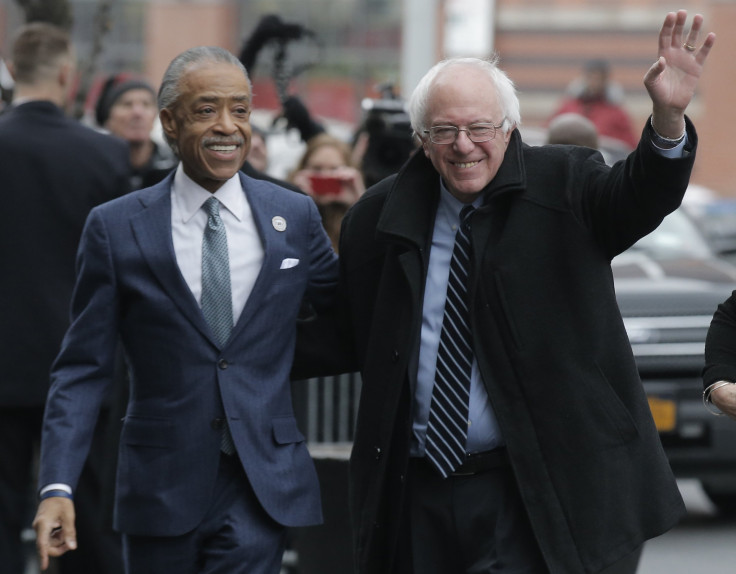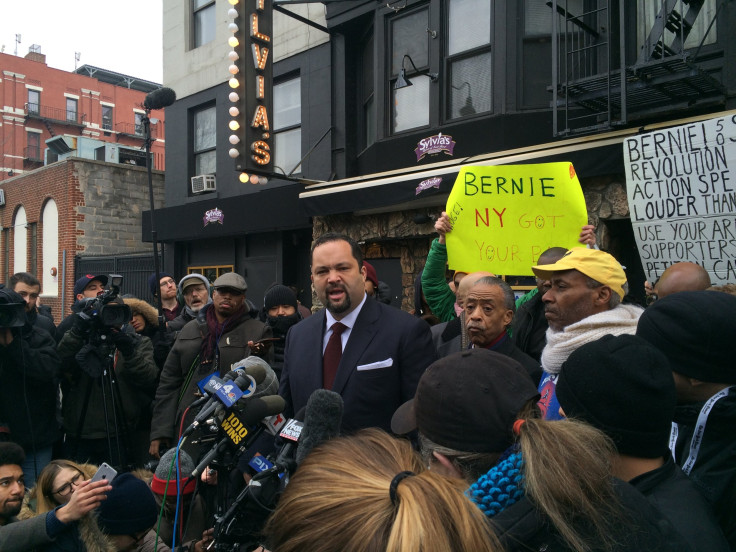Bernie Sanders And Young Black Voters: How Al Sharpton Meeting May Not Secure African-American Support

Bernie Sanders is trying to send Hillary Clinton a message on black voters: Don’t count him out. But while the Vermont senator is racking up an eclectic group of high-profile black endorsements, he has lots of work to do to convince young African-Americans he is the candidate for them.
Hours after his historic victory in the New Hampshire primary Tuesday night, Sanders met with the Rev. Al Sharpton for breakfast at Sylvia’s Restaurant in Harlem, New York City, Wednesday morning. The highly publicized visit gave the two an opportunity to discuss issues important to the black community, Sharpton said afterward while describing the meeting. But, he added, it did not constitute an endorsement.
“It’s important that these issues be raised. I asked him very bluntly about Flint [Michigan's water crisis], I asked him very bluntly about affirmative action, I asked him very bluntly about the issues of police brutality and police misconduct,” Sharpton said in a news conference following the breakfast.
Sanders has done well in the first two states to vote, overwhelmingly white Iowa and New Hampshire, but he still lags behind Clinton in polls among voters of color, who make up significant portions of the Democratic primary electorate in Nevada, South Carolina and the states that will vote on Super Tuesday, March 1.
While Sanders has been routing Clinton among young voters overall, few polls have tracked younger African-American voting preferences. As Sanders met with Sharpton in Harlem, the majority of young people interviewed there Wednesday were largely unaware of the Vermont senator's presence, or even who he is, signifying that he has far to go before securing support from the coveted demographic.
I am meeting with Senator Bernie Sanders at Sylvia's Restaurant in Harlem. pic.twitter.com/Myf75EdgWW
— Reverend Al Sharpton (@TheRevAl) February 10, 2016
The Sharpton-Sanders summit at Sylvia's was reminiscent of one Sharpton held with then-Illinois Sen. Barack Obama when he was running for president in 2008 — the civil rights activist and radio host even sat in the same seat Wednesday morning as he did eight years ago. But while Sharpton backed Obama in 2008 and has been a prominent voice in the black community for decades, he is now 61, and his influence may not hold the same sway among young voters that it does with older generations.
“Al Sharpton wouldn’t matter to me; he doesn’t tell me how to vote,” Jacki Harris, a 27-year-old probation officer, said as she passed Sylvia’s on Wednesday morning on her way to work. “He’s more of a public figure, so he’s always putting himself out there.”
Harris, who lives in Harlem, said she follows election news but admitted to not knowing who Sanders was. She knew she did not like Republican front-runner Donald Trump and was probably leaning toward Clinton, she said. She had heard about Clinton’s efforts to reach out the black community and thought those probably influenced her opinion of the candidate.
“I’m looking into the scandal around Hillary Clinton, but I support her,” Harris said. “Her husband was president and she was secretary of state, so she has a lot of experience.”
Harris was far from the only person not to recognize Sanders’ name Wednesday. A Public Policy Polling survey from last week showed that while Clinton has a 79-9 favorability rating among African-Americans, Sanders’s score was 27-23, with half of the sample still “unsure” of their opinion about him.
"Yes, I will be voting for @BernieSanders." Watch our interview with @tanehisicoates at https://t.co/Xup8cdtnFB pic.twitter.com/Bq7NIGrlJH
— Democracy Now! (@democracynow) February 10, 2016
Clinton has a history of support among the black community, and has a number of endorsements of her own. She recently visited Flint, Michigan, to talk to leaders there about the city’s water-poisoning crisis, and announced she will campaign with the mothers of Eric Garner and Trayvon Martin, unarmed African-Americans who died in controversial encounters with police and a neighborhood watchman, respectively.
Her campaign is acutely aware of their reliance on the black vote, and after her defeat in New Hampshire, is expected to introduce a new focus on systemic racism, criminal justice reform, voting rights and gun violence, Politico reported Tuesday.
“It will be very difficult, if not impossible, for a Democrat to win the nomination without strong levels of support among African-American and Hispanic voters,” Clinton’s campaign manager Robby Mook said in a memo sent to reporters.
Sharpton said he is also meeting with Clinton and other African-American leaders next Thursday, and later he may decide on an endorsement. The Wednesday meeting with Sharpton was particularly critical for Sanders in conveying his commitment to causes like civil rights and criminal justice reform, as part of the reason he has seemingly lagged among African-Americans has been his strict focus on economic issues.
While surveys from Pew Research and Gallup have shown those issues are important to voters of color, Sanders got a slow start to reaching out to the black community. Over the summer, he walked off a stage in Seattle when interrupted by Black Lives Matter protesters and has at times appeared awkward when discussing topics outside his comfort zone.

Some young African-Americans, however, were excited by Sanders’ message. Before the press conference Wednesday, a group of supporters cheered “Bernie, Bernie” and “Bern, baby, Bern!” Gvonni Gregg, also of Harlem, showed up before Sanders arrived at Sylvia’s and seemed excited once he realized who would be coming.
“I heard of him on the news this morning. I saw that he was shooting baskets with his grandkids,” Gregg, 30, said of Sanders. “Being from a harsh environment where there’s a lot of poverty, I’d like to see somebody who can bring change. I think Bernie can change a lot of things.”
John Almonds, also 30 years old, said he felt Sanders was “the realest” candidate, but was not interested in Sharpton’s opinion. Of Clinton, he said her email scandal concerned him. “I don’t trust her,” Almonds added. “She’s just not a people person. I’ve seen her in New York with my own eyes and she’s not good at interacting with people. “
Sanders has gotten the endorsements of several prominent African-American leaders, including Professor Cornel West, Ohio state Sen. Nina Turner and Atlanta-based rapper Killer Mike. Former NAACP President Ben Jealous and New York state Sen. Bill Perkins, who also are backing Sanders, appeared alongside Sharpton Wednesday morning.
“This election is absolutely critical for our children. There is no candidate in this election that is fiercer at standing up for those who need allies in the struggle than Bernie Sanders,” Jealous said at the news conference. “It’s time for all of us to tune in and ask the tough questions, who will stand up for us, who will fight for us and who will make sure that our children prosper and not get sent to prison.”
Jealous emphasized that Sanders has been consistent in his commitment to racial justice since his days as a student at University of Chicago more than 50 years ago, when he protested housing segregation in the city. He added that he had been impressed by Sanders’ racial justice platform and said he expected some pastors and other black leaders in the South to back the Sanders campaign in the coming weeks.
Still, for people not already involved in activism or campaign politics, racial issues are not necessarily the top priority. Victoria Daniels, 31, stopped when she saw the crowd outside Sylvia’s Wednesday morning. “Hillary is running, right? I’m for her,” Daniels said. “She advocates for higher pay and issues like that.” When she heard who the crowd was waiting to see, she added: “Who is Bernie Sanders?”
© Copyright IBTimes 2024. All rights reserved.






















